| Srl | Item |
| 1 |
ID:
175056
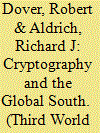

|
|
|
|
|
| Summary/Abstract |
For decades, espionage during the Cold War was often presented as a competition between East and West. The extent to which the Global South constituted the main battleground for this conflict is now being appreciated, together with the way coups and covert regime change represented a continuation of colonialism by other means. Recent revelations about the nature of technical surveillance and signals intelligence during this period paint an even more alarming picture. New research materials released in Germany show the ways in which Washington, London and even Moscow conspired to systematically attack the secure communications of the Global South. For almost half a century, less advanced countries were persuaded to invest significant sums in encryption machines that were adapted to perform poorly. This was a deceptive system of non-secrecy that opened the sensitive communications of the Global South to an elite group of nations, that included former colonial rulers, and emergent neo-imperial powers. Moreover, the nature of this technical espionage, which involved commercial communications providers, is an early and instructive example of digital global information inequality.
|
|
|
|
|
|
|
|
|
|
|
|
|
|
|
|
| 2 |
ID:
087899
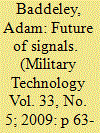

|
|
|
| 3 |
ID:
101956
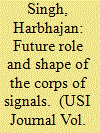

|
|
|
| 4 |
ID:
157669
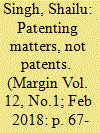

|
|
|
|
|
| Summary/Abstract |
This article looks at the association between firm market value and patenting activity in the Indian manufacturing sector, using a matched panel dataset of 380 firms spanning 22 industry groups over the period 2001–2010. To see whether the very act of patenting matters or not we introduce variation through an indicator variable indicating a firm’s patenting status, whereas to see whether having a larger number of patents matters for firm value we employ a patent stock variable. Differences in the response of firm market value to variations in these two different ways of capturing patents provide evidence for the signalling role of patents in the context of Indian manufacturing. The empirical investigations indicate that while firms that use patents to protect their innovations have a significantly higher market value than firms that do not, an increase in the number of patents granted to a firm is associated with higher market value only for firms at the lowest end of the market value distribution. The results are consistent with the explanation that patents serve as signals of firm quality.
|
|
|
|
|
|
|
|
|
|
|
|
|
|
|
|
| 5 |
ID:
098414
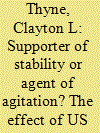

|
|
|
|
|
| Publication |
2010.
|
| Summary/Abstract |
This article takes a two-step approach to improving our understanding of how US foreign policy signals affect the likelihood of coups in Latin America. First, a large body of qualitative literature has developed a 'conventional wisdom' on this subject, suggesting that pressure from the USA plays a key role in stabilizing favored leaders and destabilizing unfavored leaders. Meanwhile, quantitative scholarship analyzing coups focuses almost exclusively on intrastate factors. The first step brings these two bodies of work together by providing quantitative evidence that hostile US signals increase the likelihood of coups, while supportive signals have a stabilizing effect. The second step moves beyond the conventional wisdom by (1) reconsidering theoretical assumptions within the conventional argument and (2) identifying anomalies within the preliminary empirical analyses. These efforts reveal several factors that are likely to impact how coup plotters respond to US signals. Among these factors, empirical analyses indicate that US signals are particularly important when economic dependence on the USA increases, during the middle of a US president's term in office, when they have moderate levels of consistency, and when they specifically mention the military. Overall, the first stage of this article provides a robust confirmation of the conventional wisdom, while the second stage moves the literature down a path that is largely unexplored by previous work.
|
|
|
|
|
|
|
|
|
|
|
|
|
|
|
|
| 6 |
ID:
163647
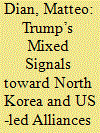

|
|
|
|
|
| Summary/Abstract |
The relationship between the Trump administration and the regime in Pyongyang has gone through two distinct phases: a period of crisis and confrontation, roughly corresponding to the year 2017, and a period of diplomacy and détente in the first half of 2018, which culminated in the Singapore summit of June 2018. During both phases, Trump’s approach has been characterised by a high degree of unpredictability and the use of ‘mixed signals’. As a consequence, while the US achieved a significant objective in 2018, namely a reduction in tension and risk of conflict, this came at a considerable cost, especially in terms of the solidity of the US-led alliances in East Asia.
|
|
|
|
|
|
|
|
|
|
|
|
|
|
|
|